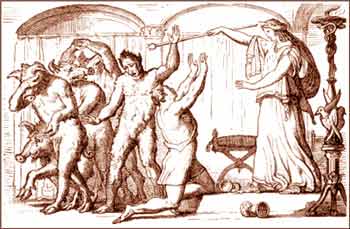The Lady Circe remembers those pigs like the sea remembers the waves.
— the Porcine Oracle
Poetry Updates for November 2010
A mythical female being capable of the magic of metamorphosis is a thematic form found in many of this world’s oldest oral and written traditions. A goddess, witch, enchantress or sorceress, she has been a regular and entertaining character for centuries, a star in adventures laden with symbolic and moral intent.

The poet Homer (c. 800 BC) included her under the name ‘Circe’ in his Odyssey, and so the goddess has remained under that name to present times. Authors since Homer have found Circe almost as utilitarian and useful as the pigs she creates. Circe is a liaison between the magical and the natural worlds, an allegory of some of the timeless vagaries and inconsistencies of amorous relationships.
Circe is also an archetype – the eternal mistress. She is powerful yet conquerable, supernatural yet earthbound, self-sufficient yet accessible, obviously dangerous yet forever desirable. Circe has one fearsome quality; she sees clearly into men’s cravings and is able to bless them with tangible and visible snouts appropriate for their principles and predispositions.
In celebration of Circe, Porkopolis.org recently added the works of 22 more poets to its Library. Poets like Margaret Atwood and C.S. Lewis, Lawrence Durrell and D. H. Lawrence, Sujata Bhatt, Carol Ann Duffy and Ovid, all of whom have considered the zeitgeist of Circe’s world and her preference for pigs over men.
In these poems she is portrayed as beautiful, perhaps impulsive, but also wise; sensual but not always amorous; hopeful but with pragmatic expectations. There is no official list of these Circe poems. True adventurers who want to pursue the fair-tressed goddess here need only type “circe” in the search box and enter…
Homer. The Odyssey. translated by Emile Victor Rieu. Baltimore: Penguin Books (1946).
